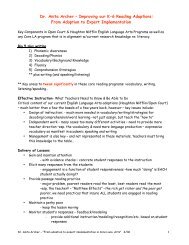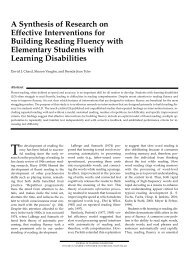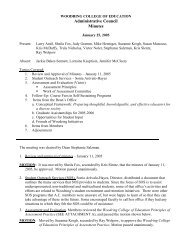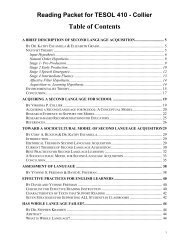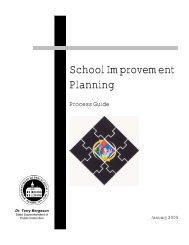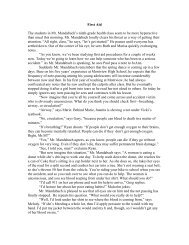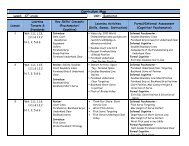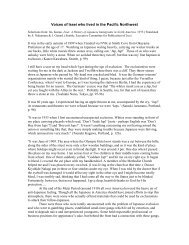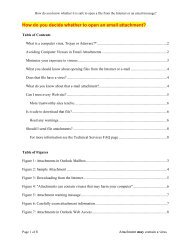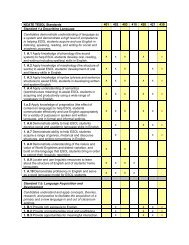Art Un ticle I.1 ited Sta In the ates News - Woodring College of ...
Art Un ticle I.1 ited Sta In the ates News - Woodring College of ...
Art Un ticle I.1 ited Sta In the ates News - Woodring College of ...
- No tags were found...
You also want an ePaper? Increase the reach of your titles
YUMPU automatically turns print PDFs into web optimized ePapers that Google loves.
What <strong>In</strong>formation Is Needed About a Student?Tests provide information about a student that is not o<strong>the</strong>rwise available from records or simpleobservation.They also document that information for an audience—such as <strong>the</strong> public, parents, orpolicymakers—in a way that makes sense to <strong>the</strong> audience. <strong>In</strong> ei<strong>the</strong>r case, a test provides certainkinds <strong>of</strong> information, and we cannot wisely select our assessment strategies for ei<strong>the</strong>r purposeunless we know what that information is. When we want to assess students, who are lim<strong>ited</strong> in<strong>the</strong>ir English pr<strong>of</strong>iciency, examples <strong>of</strong> <strong>the</strong> kinds <strong>of</strong> needed information may include:• Can <strong>the</strong> student participate in <strong>the</strong> oral language <strong>of</strong> a mainstream classroom?• Can <strong>the</strong> student read and write English at levels similar to his or her mainstream gradem<strong>ates</strong>?• Does <strong>the</strong> student need an ESL or bilingual program?• If <strong>the</strong> student needs an ESL or bilingual program, what should his or her placement be?• Does <strong>the</strong> student read and write <strong>the</strong> native language at grade level?• Are <strong>the</strong> student’s academic skills near grade level in <strong>the</strong> native language?• What specific aspects <strong>of</strong> English grammar or vocabulary does <strong>the</strong> student lack?• Is <strong>the</strong> student progressing in oral or written English?The trick becomes matching <strong>the</strong> right assessment strategy to <strong>the</strong> school’s purposes, that is,getting <strong>the</strong> answers to <strong>the</strong> school’s questions about <strong>the</strong> student. The right strategy might be apublished test, application <strong>of</strong> a scoring rubric, or simply <strong>the</strong> teacher’s informed observation <strong>of</strong> astudent’s performance. <strong>In</strong> any case, <strong>the</strong> strategy must meet this one criterion: The assessmenttasks must represent <strong>the</strong> kind <strong>of</strong> information <strong>the</strong> school wants to know about <strong>the</strong> student. Each <strong>of</strong><strong>the</strong>se kinds <strong>of</strong> information places certain requirements on <strong>the</strong> test. Figure 1 illustr<strong>ates</strong> this pointby listing requirements a test should meet to answer <strong>the</strong> questions listed above.Figure 1 Requirements a Test Should MeetQuestionCan <strong>the</strong> student participate in <strong>the</strong> orallanguage <strong>of</strong> a mainstream classroom?Can <strong>the</strong> student read and write English atlevels similar to his or her mainstream gradem<strong>ates</strong>?Does <strong>the</strong> student need an ESL or bilingualprogram? If <strong>the</strong> student needs an ESL orbilingual program, what should his or herplacement be?Does <strong>the</strong> student read and write <strong>the</strong> nativelanguage at grade level?Are <strong>the</strong> student’s academic skills near gradelevel in <strong>the</strong> native language?RequirementsThe tasks must simulate <strong>the</strong> oral language <strong>of</strong> amainstream classroom.Ask <strong>the</strong> student to read or write something atthat level.Give tasks that represent a range <strong>of</strong> difficulty,from grade-level performance to little or noEnglish pr<strong>of</strong>iciency.<strong>Sta</strong>ff need to know what that language’sgrade-level expectations are; tasks shouldrequire <strong>the</strong> student to read and writesomething at that level.Give tasks that represent that language’sgrade-level standards in <strong>the</strong> academic areas <strong>of</strong>interest.What specific aspects <strong>of</strong> English grammar or Tasks should pinpoint specific grammatical© 2008 Dr. Ca<strong>the</strong>rine CollierAll Rights Reserved144




